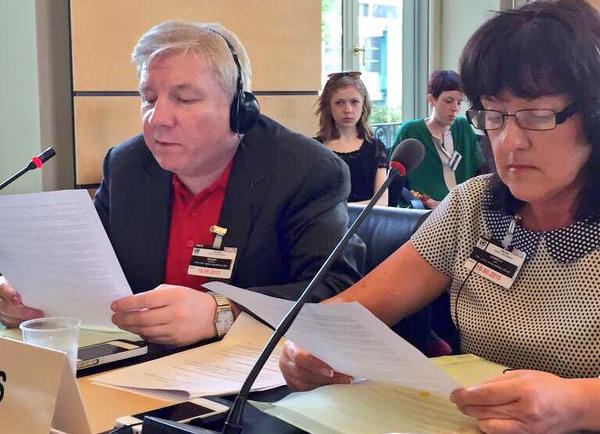 A major UN Human Rights Committee today told Ireland to stop breaching the human rights of atheists and minority faith citizens in the education system, as well as in abortion law and the ability to vindicate human rights in practice.
A major UN Human Rights Committee today told Ireland to stop breaching the human rights of atheists and minority faith citizens in the education system, as well as in abortion law and the ability to vindicate human rights in practice.
The UN report vindicates the complaints raised by Atheist Ireland in Geneva two weeks ago when we briefed the Committee on Economic, Social and Cultural Rights, and it makes several recommendations that Atheist Ireland specifically suggested.
Ending all religious discrimination in education
The Committee recommends that Ireland:
(a) Take all necessary measures to bring all relevant laws, including the Equal Status Acts 2001 and the Education (Admission to Schools) Bill 2015 in line with the international human rights standards and to increase the number of non-denominational schools at the primary and post-primary education levels;
(b) Review admissions policies of all schools with a view to removing all discriminatory criteria for enrolment and establish a regulatory mechanism to monitor school policies, including admissions policies.
Second UN rebuke in two years for Ireland
Both major UN Human Rights Committees have now condemned Ireland’s lack of separation of church and state in education and other laws. Last year it was the Committee on Civil and Political Rights, and this year it is the Committee on Economic, Social and Cultural Rights.
Atheist Ireland has now succeeded in getting four UN Committees to call for secular education in Ireland. These are the Committees on Civil and Political Rights, ESC Rights, the Rights of the Child, and Racial Discrimination.
Atheist Ireland also welcomes the observations relevant to other groups who are discriminated against in Ireland, and we will continue to work with FLAC and the other civil society groups who also briefed the committee in Geneva.
Abortion and Magdalene Laundries
As well as religious discrimination in education, the Committee makes several other important recommendations on issues that were raised by Atheist Ireland:
On abortion, the Committee recommends that Ireland take all necessary steps, including a referendum on abortion, to revise its legislation on abortion, including the Constitution and the Protection of Life During Pregnancy Act 2013, in line with international human rights standards; adopt guidelines to clarify what constitutes a real substantive risk to the life of a pregnant woman; publicize information on crisis pregnancy options through effective channels of communication; and ensure the accessibility and availability of information on sexual and reproductive health.
On the Magdelene laundries, The Committee recommends that Ireland conduct a prompt, thorough and independent investigation into these allegations, bring those responsible to justice and provide all victims with effective remedies.
Other recommendations raised by Atheist Ireland
On non-discrimination, The Committee recommends that Ireland adopt comprehensive anti-discrimination legislation that includes all the grounds for discrimination set out in article 2, paragraph 2, of the Covenant. The Committee refers in this regard to its General Comment no. 20 (2009) on non-discrimination and economic, social and cultural rights.
On gender equality, The Committee recommends that Ireland amend article 41.2 of the Constitution with a view to rendering provisions in the Constitution gender-equal. It also recommends that the State party take effective measures to increase women’s representation in decision-making positions in all areas, to close the gender pay gap and to eliminate the strong gender role stereotypes.
On the Irish Human Rights and Equality Commission, the Committee is concerned that the limited scope of human rights provided in Section 29 of the IHREC Act, coupled with the lack of recognition of economic, social and cultural rights in domestic law, is a major factor in preventing the IHREC from covering and applying the full range of Covenant rights in exercising its mandate.
The Committee recommends that the State party review the Act with a view to ensuring that the IHREC covers and applies all rights enshrined in the Covenant in exercising its functions.
On applying the Covenant into domestic law, the Committee reiterates its recommendation that Ireland take all appropriate measures to ensure the direct applicability of the Covenant provisions, including through incorporation of the Covenant, in its domestic legal order, and enhance training for judges, lawyers and public officials. The Committee draws the State party’s attention to its General Comment No. 9 (1998) on the domestic application of the Covenant.